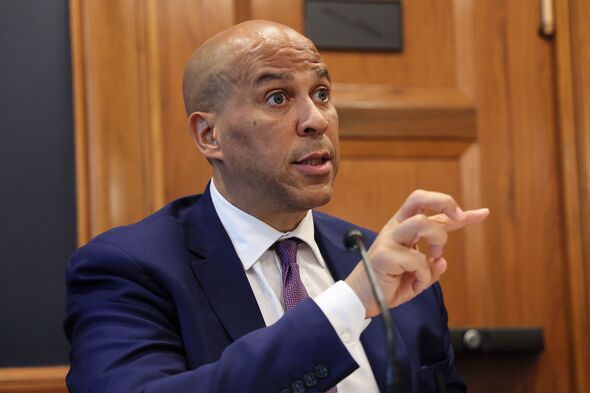Senator Cory Booker recently ignited a fierce intra-party debate, publicly accusing his Democratic colleagues of complicity with former President Donald Trump’s controversial funding freeze, an act he contends severely impacts several Democratic-led states. The New Jersey lawmaker’s impassioned outburst underscored deep-seated frustrations over the perceived lack of advocacy for crucial federal grants, particularly those earmarked for police departments.
The heated exchange unfolded during a Senate session as Senator Catherine Cortez Masto sought unanimous consent to advance a legislative package. Booker’s objection, echoing across the chamber, highlighted a profound disagreement within the party ranks, suggesting a reluctance among some Democrats to challenge executive actions that disproportionately affect specific states.
“This, to me, is a problem with Democrats in America right now, is we’re willing to be complicit to ,” Booker reportedly seethed, according to The Hill. His scathing remarks implied that by not forcefully advocating for the release of these critical funds, some Democratic senators were inadvertently enabling Trump’s agenda, thereby abandoning their constituents in blue states.
The potential 2028 presidential nominee articulated a compelling argument that Democrats ought to be more assertive, even willing to leverage proposals like boosted police funding, to compel the former president to release his grip on essential federal aid. Booker insisted the Democratic Party required a “wake-up call,” asserting that colleagues sworn to uphold the Constitution were “looking the other way.”
Booker specifically highlighted the plight of New Jersey, New York, California, and Illinois, states predominantly Democratic, that had received no federal grants for their police departments. He asserted that the president had deliberately frozen funding to these states, urging his colleagues, “Don’t be complicit to the president of the United States,” emphasizing the urgency of the situation for affected communities.
The order to freeze these critical funds reportedly originated on January 20, marking the day of Trump’s return to office. In a significant counter-move, New York Attorney General Letitia James spearheaded a coalition comprising 22 state attorneys general who collectively filed a motion challenging what they unequivocally labeled as Trump’s “reckless and illegal funding freeze,” escalating the legal battle.
The internal party strife intensified when Senator Amy Klobuchar interjected, claiming that Booker had previously objected to her policing legislation, predating Trump’s tenure. Her pointed remark, “I will note that Sen. Booker objected to my police reauthorization bill, the cops funding, the Clinton cops funding, long before came into office,” suggested a pattern in Booker’s legislative objections.
Klobuchar further escalated the tension by subtly criticizing Booker for his absence during the bill’s markup and committee passage. “I can’t help it if someone couldn’t change their schedule to be there,” she stated, a comment that reportedly irritated Booker, adding a personal dimension to the already charged political debate and underscoring the complexities of legislative processes.






Leave a Reply